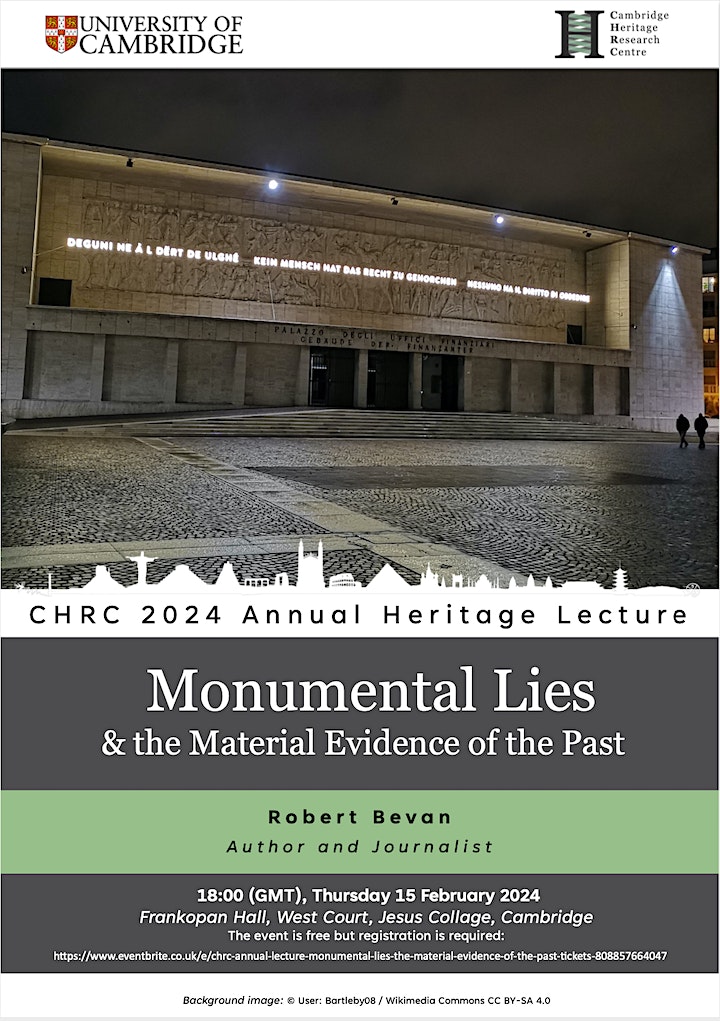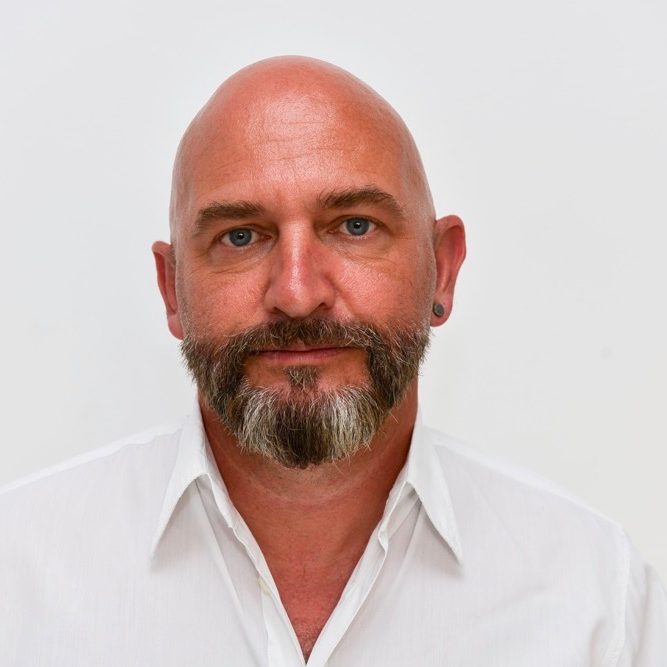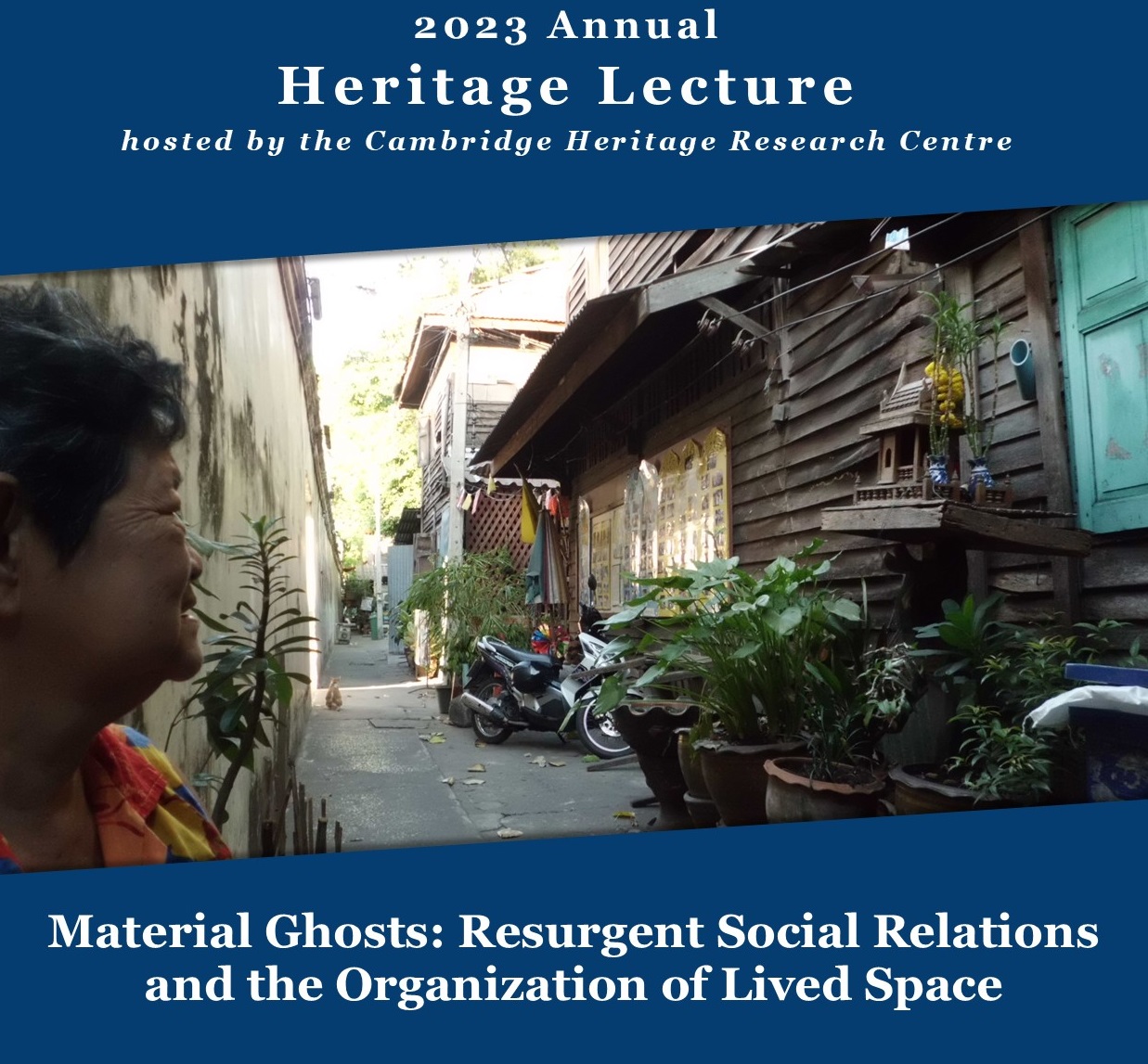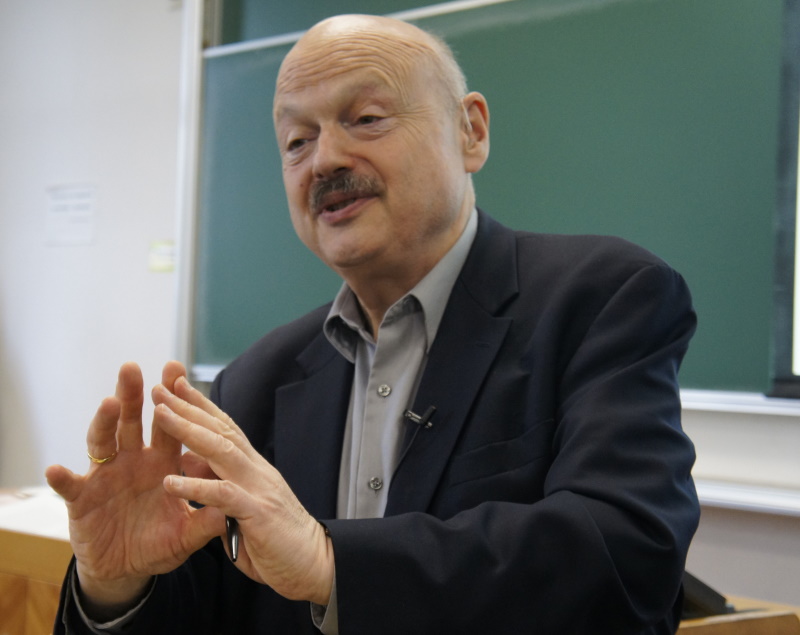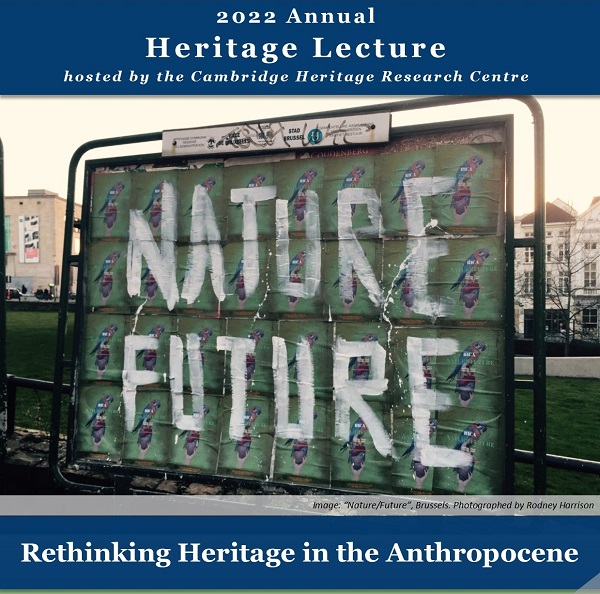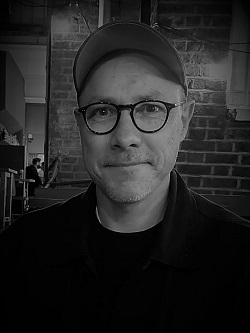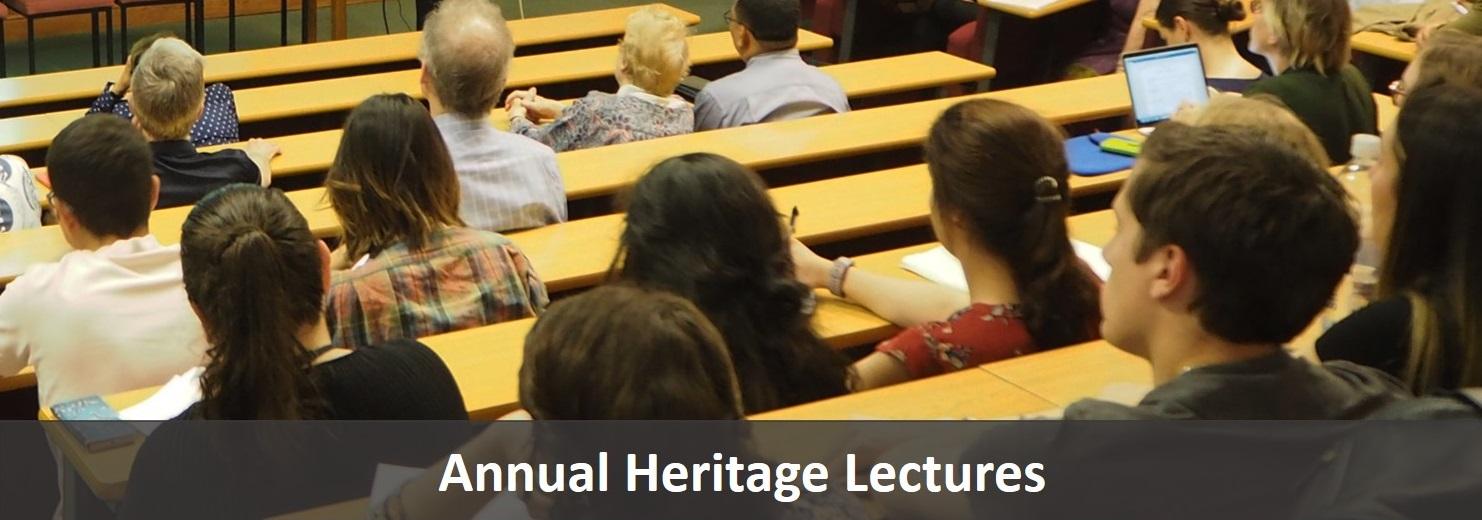
The Annual Heritage Lecture invites speakers of international reputation to give a public lecture on an aspect of heritage research.
8th Annual Heritage Lecture
The Cambridge Heritage Research Centre 8th Annual Heritage Lecture will be given by
Professor Aleida Assman
(Universität Konstanz)
Changing concepts of the Future and the 'Ethics of Repair.'
will be held at Frankopan Hall, West Court, Jesus College, Jesus Lane, Cambridge, at 6:00pm, Friday 28th of February, 2025
The Annual Heritage Lectures are free public lectures, but registration is required. Please register (even if attending online) via: www.heritage.arch.cam.ac.uk/events/annual-lectures
Over the last decades, the Western concept of ‘future’ has changed radically. The lecture will focus on this change in the larger framework of “the decline of the time regime of modernity”. As sociologist Andreas Reckwitz has just argued in a recent study, the decline of the promise of continuous progress is responsible for a wide-spread “sense of loss” in middle-class society. But this is not the whole story. It has also opened up the space for alternative forms of imagining the future and new perspectives for the politics of remembering, forgetting and dealing with the past. One of them is an “ethics of repair” that is being proposed as a new framework for dealing with heritage in the context of modern architecture.
Please share the event widely with the attached poster and we hope to see many of you there!
7th Annual Heritage Lecture
The Cambridge Heritage Research Centre 7th Annual Heritage Lecture will be given by
Robert Bevan
Author and Journalist
Monumental Lies & The Material Evidence of the Past
will be held at Frankopan Hall, West Court, Jesus College, Jesus Lane, Cambridge, at 6:00pm, Thursday 15 February, 2024
The Annual Heritage Lectures are free public lectures, but registration is required.
To register follow this link.
Please note - this is an in person only event. A recording of the talk will be made available on the Cambridge Heritage Research Centre YouTube channel as soon as possible.
About the lecture
The past is weaponised in culture wars and the city is cynically edited by those who wish to impose their ideology upon the physi- cal spaces around us. This is not just about statues of slavers or colonialists; Holocaust deniers, for example misuse details of the ruins of the gas chambers at Auschwitz to promote their ‘no holes; no Holocaust’ lies. To guard against this manipulation, the preservation of the material evidence of history is crucial. Yet longstanding concepts such as ‘authenticity’ in heritage are being undermined by gatekeepers such as UNESCO and by the prioritisation of memory and impressions over facts. The past cannot be denied but nor should it be allowed to stand without criticism. In Monumental Lies: Culture Wars and the Truth about the Past, Robert Bevan argues that if monuments and architecture really are evidence then we need to be inventive about transforming sites of honour into sites of shame.
About our Speaker
| Robert Bevan is an author and journalist. He is the author of Monumental Lies: Culture Wars and the Truth about the Past (Verso), a book of the year for the Financial Times and the Art Newspaper. His previous book, The Destruction of Memory: Architecture at War was described as “ground-breaking” by the New York Review of Books. He is a member of the Mayor of London’s Commission on Diversity in the Public Realm, and ICORP, the expert committee of ICOMOS on risk preparedness. He is a heritage consultant described as “one of the most compelling progressive voices in the heritage world” (Tribune). |
6th Annual Heritage Lecture
The Cambridge Heritage Research Centre 6th Annual Heritage Lecture was given by
Professor Michael Herzfeld
Ernest E. Monrad Research Professor, Harvard University IIAS
Professor of Critical Heritage Studies Emeritus, Leiden University
Material Ghosts: Resurgent Social Relations and the Organization of Lived Space
was held at Frankopan Hall, West Court, Jesus College, Jesus Lane, Cambridge, at 6:00pm, Thursday 9 March 2023
The Annual Heritage Lectures are free public lectures.
A recording of the whole lecture is available to view online here.
About the lecture
Conventional anthropology treats the presence of ghosts as a question of belief and ritual, while heritage studies tend to treat it as a matter of narrative and thus of intangible heritage. There is, however, an alternative view that rejects the tangible-intangible binary as unnecessarily parochial, and treats spectrality as the result of the persistence of older forms of social life in the physical structures, not only of cities and buildings, but also of habitual arrangements of live bodies in meetings and other encounters. In this talk, we will examine that perspective in the context of Bangkok and Rome, two cities where the varied fortunes of older constructions have left traces that continue to influence the lives of present-day inhabitants.
About our speaker
| Michael Herzfeld is Ernest E. Monrad Research Professor of the Social Sciences at Harvard University and IIAS Professor of Critical Heritage Studies Emeritus at Leiden University. His twelve books include Siege of the Spirits: Community and Polity in Bangkok (2016) and Subversive Archaism: Troubling Traditionalists and the Politics of National Heritage (2021). His current research addresses heritage politics, cryptocolonialism, and artisans’ practices of competition and cooperation. |
5th Annual Heritage Lecture
The Cambridge Heritage Research Centre 5th Annual Heritage Lecture was given by
Professor Rodney Harrison (UCL Institute of Archaeology)
Rescheduled, was given online via Zoom at 5pm on Thursday 24 February 2022.
Rethinking Heritage in the Anthropocene
The Annual Heritage Lectures are free public lectures.
A recording of the whole lecture is available to view online here.
About the lecture
The last few decades have witnessed the declaration of a series of interlinked ecological and cultural crises-of climate, history, race, and biological and cultural diversity-which have had and continue to have a fundamental impact on the planet and its human and non-human occupants alike. Accordingly, this talk draws on a number of recent international collaborative research projects which aim to address the role of heritage and heritage studies in the Anthropocene. These projects have been characterised by collaborative partnerships with heritage sector organisations and other actors which have sought to intervene not only critically, but also practically in the role of natural and cultural heritage preservation within the climate, extinction and race crises. They have done so by engaging organisations and publics as co-researchers in the research process and in aiming to rethink the conscious practical role of heritage in building distinctive future worlds.
About our speaker
| Rodney Harrison is Professor of Heritage Studies at the UCL Institute of Archaeology, where he is Co-Director of the Joint UCL/University of Gothenburg Centre for Critical Heritage Studies (CCHS). His work has been central to the establishment of critical heritage studies as a topic of research and teaching. From 2017-2021 he was AHRC Heritage Priority Area Leadership Fellow, from 2015-2019 he was Principal Investigator on the AHRC-funded Heritage Futures research programme, and from 2016-2021 he led the Work Package on “Theorizing heritage futures in Europe: heritage scenarios” as part of the European Commission funded Marie Sklodowska-Curie action [MSCA] Doctoral Training Network CHEurope: Critical Heritage Studies and the Future of Europe. He is (co)author or (co)editor of 20 books and guest edited journal volumes and almost 100 peer reviewed journal articles and book chapters. Some of these have been translated into Chinese, Italian, Polish and Portuguese language versions. In addition to the AHRC his research has been funded by the UKRI/Global Challenges Research Fund, British Academy, Wenner-Gren Foundation, Australian Research Council, Australian Institute of Aboriginal and Torres Strait Islander Studies and the European Commission. He has conducted archaeological, anthropological and/or archival research in Australia, Southeast Asia, North America, South America, the Middle East, UK and continental Europe. His most recent books, all co-authored/edited and available in open access, include Heritage Futures: Comparative Approaches to Natural and Cultural Heritage Practices (UCL Press, 2020), Deterritorializing the Future: Heritage in, of and after the Anthropocene (Open Humanities Press, 2020) and Reimagining Museums for Climate Action (Museums for Climate Action, 2021). |
4th Annual Heritage Lecture
The CHRC was honoured to host (virtually at least) Prof. Laurajane Smith (Australian National University), one of the most distinguished and influential scholars in the field of Heritage Studies to give the 4th Annual Heritage Lecture. The lecture, The Emotional Politics of Heritage, was the first of the Annual Heritage Lectures to be given online.
A recording of the whole lecture is available to view online here.
The Emotional Politics of Heritage
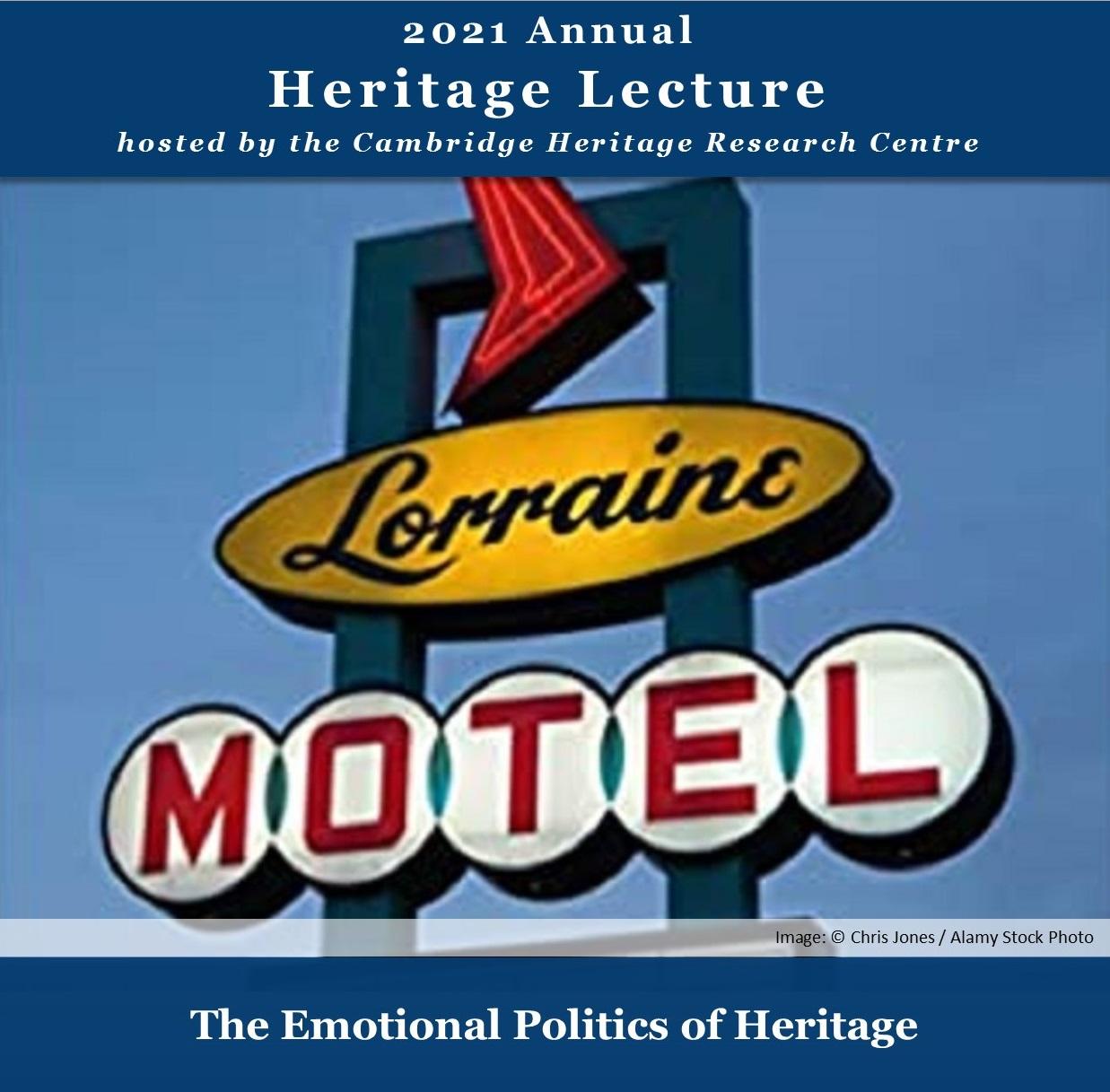
This talk, drawing Professor Smith’s new book 'Emotional Heritage', will theorise both the affective qualities of heritage and the processes through which heritage becomes a resource of political power. Heritage is both an emotional and political resource that is readily and visibly mobilised in right-wing populist movements. However, the lecture will also identify the less obvious and quieter ways heritage works to emotionally legitimise and maintain the status quo while also identifying the emotional registers that underline how heritage is used to affirm progressive social and political aspirations. The talk will be illustrated with cases from the USA and Australia.
 |
Laurajane Smith is the Head of the Centre for Heritage and Museum Studies at the Australian National University and the editor of the International Journal of Heritage Studies. In a distinguished career Laurajane Smith has produced some of the defining research and publications in the field of Heritage Studies, including Uses of Heritage (2006), Heritage, Communities and Archaeology (2009 with Emma Waterton), and Emotional Heritage: Visitor Engagement at Museums and Heritage Sites (2020). Her work challenges the idea of heritage as primarily or simply an ‘object’ or ‘site’, and retheorises heritage as a cultural process of meaning and memory making. |
3rd Annual Heritage Lecture
The CHRC was delighted to be welcome to Cambridge Prof. Ciraj Rassool (University of the Western Cape) in 2020 to present the 3rd Annual Heritage Lecture on Restitution and the ‘missing body’: South Africa and Austria in question. The Annual Lecture took place on 26 February 2020 in the McGrath Centre, St Catharine's College, Cambridge.
Restitution and the ‘missing body’: South Africa and Austria in question
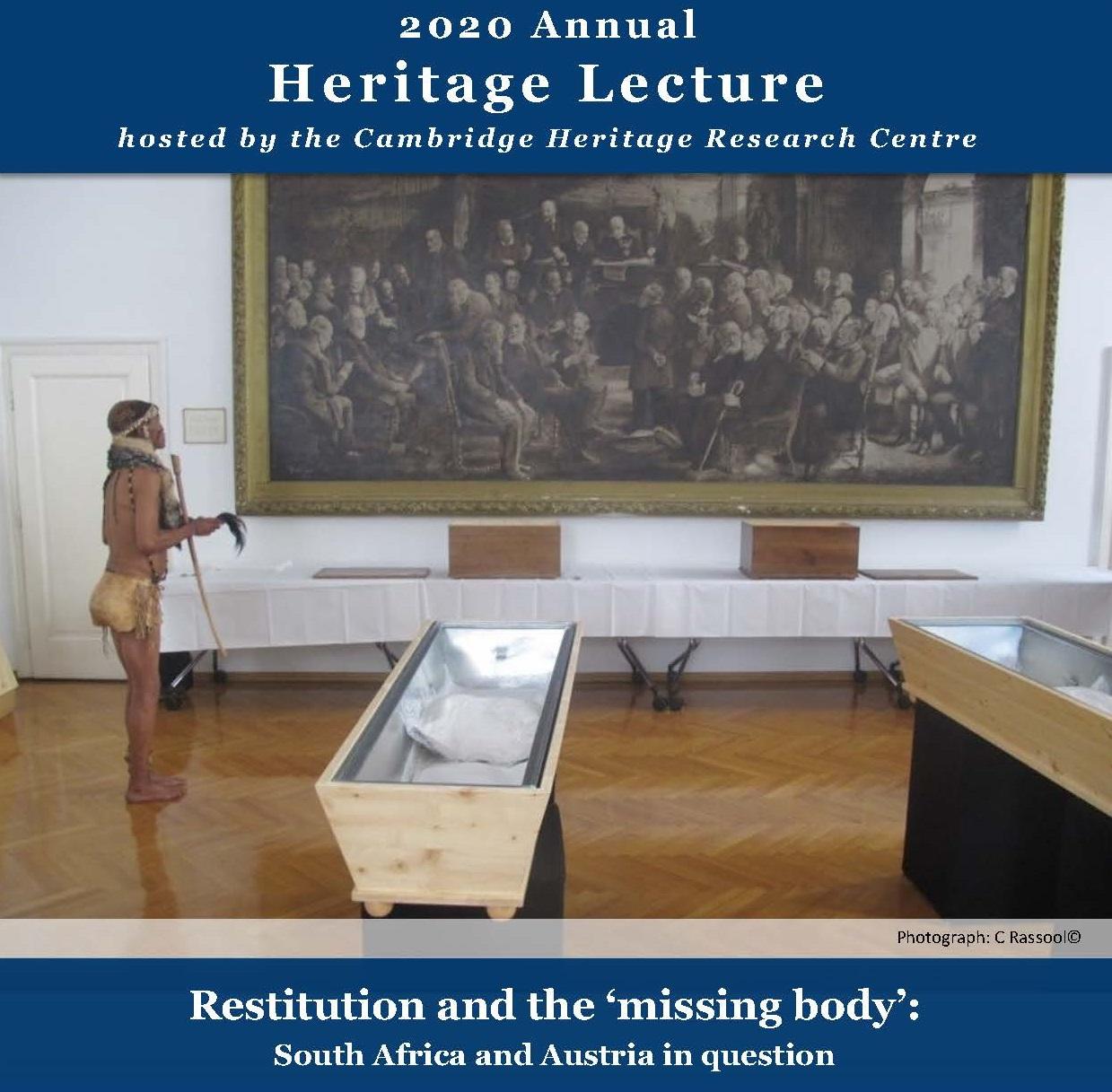
For the 3rd Annual Heritage Lecture hosted by the Cambridge Heritage Research Centre, Professor Ciraj Rassool will discuss the history of collecting by the Austrian anthropologist Rudolf Pöch in southern Africa in the first decade of the 20th century that led to the restitution of the remains of Klaas and Trooi Pienaar in 2012. It examines the specific characteristics of this restitution process, such as how it was framed as a project of rehumanisation, how the process got stalled amidst failing diplomacy between Austria and South Africa, and also what the potential is for its resuscitation.
Finally the talk is interested to discuss the meaning of restitution for museums, for questions of memory and memorial in South Africa, especially when it is located within the framework of forensic history and its developing concern with 'missingness' and missing bodies as ways of rethinking South Africa and its contested heritage.
 |
Ciraj Rassool is Professor of History at the University of the Western Cape and has directed UWC's African Programme in Museum and Heritage Studies. He was on the boards of the District Six Museum and Iziko Museums of South Africa. He has previously chaired the Scientific Committee of the International Council of African Museums (AFRICOM), and is a member of the Scientific Advisory Board for the study of the Physical Anthropology Collection ‘Felix von Luschan’ at the Museum of Ethnology at the Staatliche Museen zu Berlin, Germany. |
2nd Annual Heritage Lecture
The second Annual Heritage Lecture was given by Prof Mark Turin (University of British Columbia) on 7 May 2019 in the Frankopan Hall, Jesus College, Cambridge.
Language as Heritage: Indigenous Language Resurgence in the 21st Century
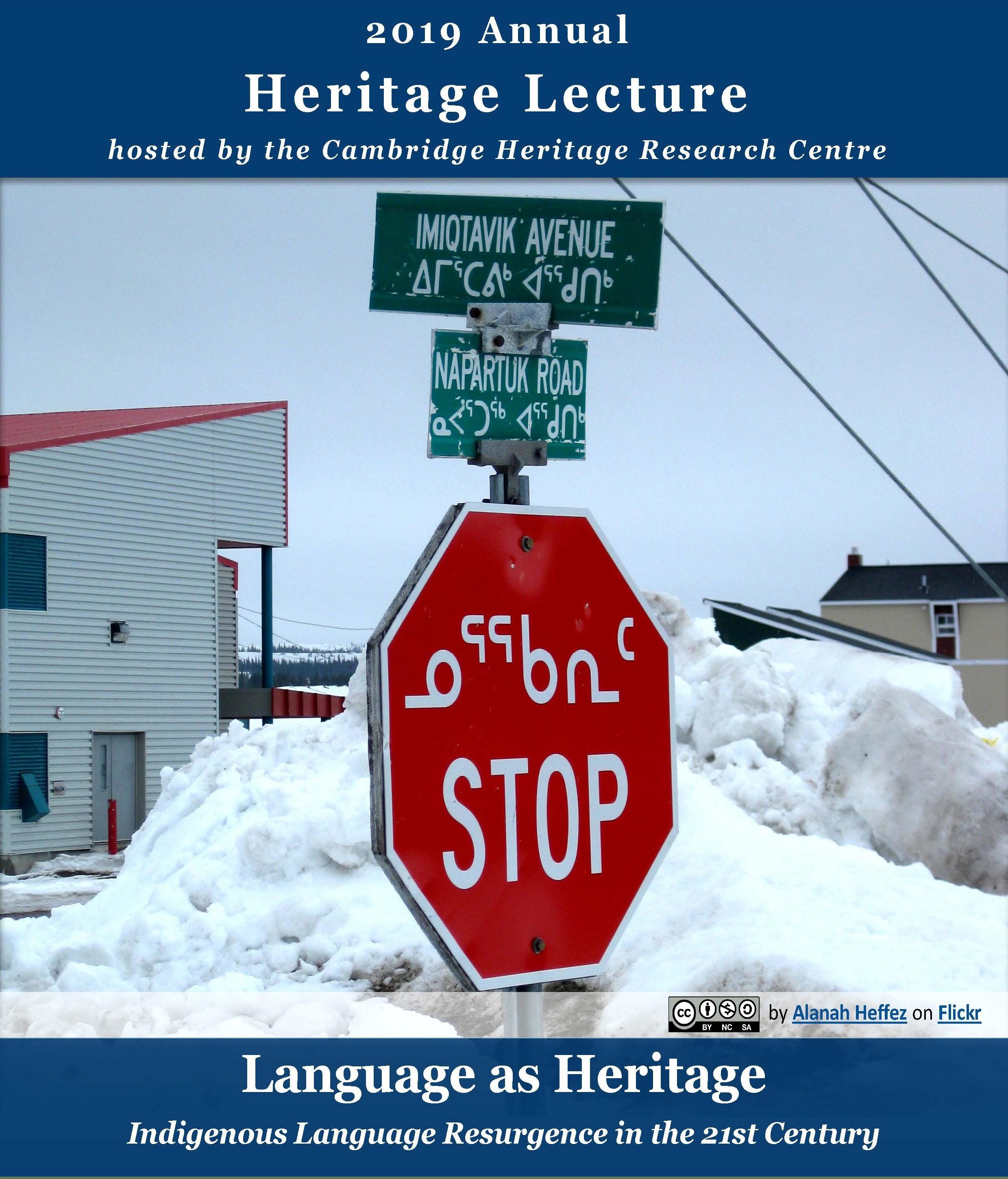
The linguistic diversity of our species is under extreme stress, as are the communities who speak these increasingly endangered languages. While some Indigenous mother tongues and narrative traditions have been in inscribed on the List of Intangible Cultural Heritage in Need of Urgent Safeguarding and on the Representative List of the Intangible Cultural Heritage of Humanity, many more have received no official recognition and continue to be oppressed by colonial-era legislation in the nation-states in which they are spoken.
In 2016, the United Nations General Assembly adopted a resolution proclaiming 2019 as the International Year of Indigenous Languages to help promote and protect indigenous languages. This celebration of Indigenous linguistic vitality and resilience is welcome, but is it enough? Does official recognition ‘work’, and if so, how? Does ‘heritaging’ language help communities to reclaim their narrative and speech traditions? And do the goals of historically marginalized communities who speak under-resourced languages align with those of immigrants who advocate for resources to have their ‘heritage’ languages taught in schools and spoken in their homes.
Engaging with critical heritage studies and an emerging body of decolonial theory on language, this richly illustrated lecture draws on contemporary and historical examples from North America and Asia to ask whether we need a new language for talking about linguistic heritage and heritage languages.
 |
Mark Turin is an Associate Professor of Anthropology and First Nations Languages at the University of British Columbia in Vancouver. Trained in anthropology and linguistics, he has worked in collaborative partnership with Indigenous peoples in the Himalayas for over 20 years and more recently with First Nations communities in the Pacific Northwest. He is a committed advocate for the enduring role of Indigenous languages, online, in print and on air. |
1st Annual Heritage Lecture
The inaugural lecture was given by Dr Helaine Silverman (CHAMP/University of Illinois) on 8 May 2018 and the full lecture is available to view below.
The Inca in the Plaza: Contesting Change in the World Heritage Historic Center of Cuzco, Peru
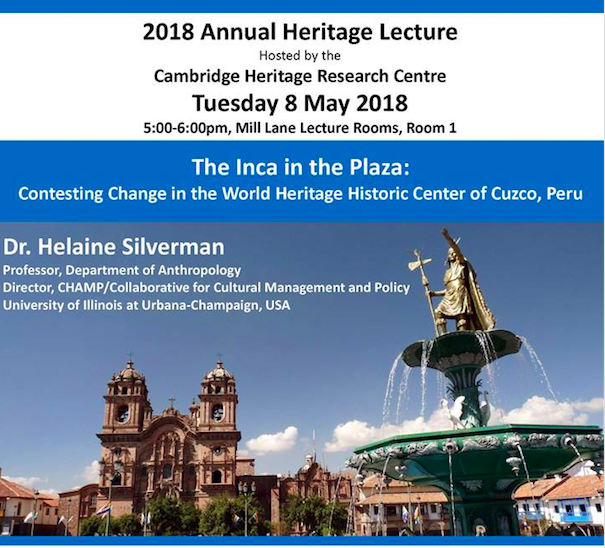
Historic urban centers constitute approximately one-third of the cultural properties on UNESCO’s World Heritage List. The expectation of UNESCO is that the architectural integrity, authenticity and physical form of an inscribed historic urban center will not change for these qualities convey the site’s Outstanding Universal Value. Yet these are inhabited places and thus subject to change.
Whereas this is recognized by ICOMOS’ new “tolerance for change” paradigm, change in heritage properties is not everywhere embraced by the official management sector. A case in point is Cuzco, Peru where the recent installation of an Inca king atop a Belle Époque fountain in the middle of the premier public space of the city has prompted a major dispute between the Municipality (which erected the statue) and the Ministry of Culture (which seeks its removal).
Beyond local political antagonisms and ambiguity in the national legal code for heritage management are intertwined issues of place, authenticity, identity, memory, visual integrity, community stakeholdership, colonial legacies and different value systems. This talk uses the controversy over “the Inca in the plaza” as a platform to discuss management of the present past in living historic urban landscapes.

